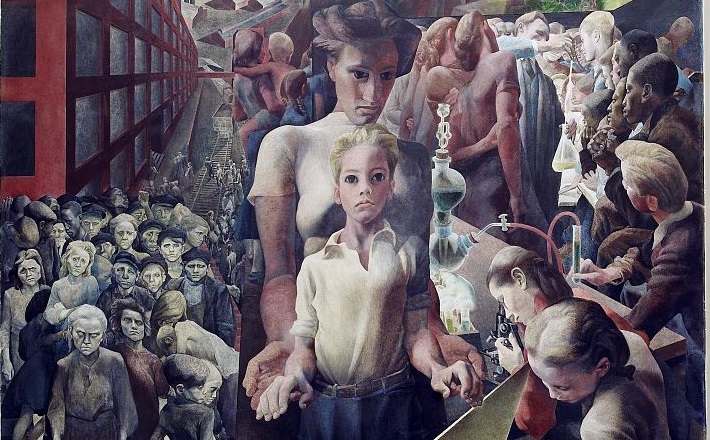Commentary on Romans 15:4-13
The second of three consecutive readings from Romans is designated for the second Sunday of Advent.
This passage is the climax of the broader argument of Romans 14-15 about the division in the community between the “strong” and the “weak” that Paul is trying to overcome. What defines the community that has trusted in the promise fulfilled in Christ’s first coming and eagerly awaits his second coming?
Paul’s answer, and his prayer for the community, is harmony and hope. As Paul explains, the past—both Christ’s work and scripture—gives shape to and encouragement for the community’s present harmony, which orients all in hope towards God’s future.
Instruction from the past: Scripture and the Christ-event (Romans 15:4, 7-12)
From the beginning of the letter Paul has argued that the Gospel is for both Jews and Greeks (Romans 1:14-17). This argument has been anchored throughout the letter in his reading of scripture. So we have here a climax both to Paul’s argument and to his way of arguing. Paul makes it clear in Romans 15:4 that the past (“whatever was written in former days”) was meant for this very present time (“written for our instruction”), in order to give hope.
Paul speaks of the “steadfastness” and “encouragement” of scripture just as he speaks of the same of God in Romans 15:5. Scripture—God’s own word—speaks from the past to give instruction for the present. Thus, in Romans 15:9-12 Paul gives four Old Testament quotations that speak to the present division within the church.
These four quotations are linked together by a catchword—“Gentiles”—and similar theme. It is important to note that Paul’s quotations align with the Greek text of the Septuagint rather than the Hebrew text (which is why the verses will look different in an English Bible). The verses from Romans 15 correspond like this:
- Verse 9 = 2 Samuel 22:50 or Psalm 18:49 (LXX Psalm 17:50; the verses are almost identical in Greek)
- Verse 10 = Deuteronomy 32:43
- Verse 11 = Psalm 117:1 (LXX Psalm 116:1)
- Verse 12 = Isaiah 11:10
For Paul, these texts looked forward to a time when the Gentiles would join Israel in the praise of God—and this eschatological hope has been fulfilled now in Christ. This is, in sum, what Paul is driving at in Romans15:8-9a: that Christ has fulfilled the promises God gave to Israel—thus showing God to be truthful in his promising—and that those promises given to the patriarchs were meant also for the blessing of the Gentiles (see also Genesis 12:1).
Hope and unity in the present and for the future (Romans 25:5-7, 13)
Because Christ has welcomed both Jews and Gentiles—in fulfillment of God’s ancient promises—the Roman Christians are to welcome one another as Jews and Gentiles. The strong are to bear with the weak (Romans 15:1), for Christ himself died “for the weak” (Romans 5:6; here, all humans without distinction).
This is an important part of Paul’s overall argument for unity and harmony in a community that has been split between the “strong” and the “weak” (all of Romans 14-15 up to this point). The Christ-event—Christ’s death and resurrection for the salvation of Jews and Gentiles—reveals the nature of God’s grace: it is a gift given without consideration of worldly worth or status. The divisions that exist within the community are overwhelmed by the grace of God for all people—that grace is the foundation for the life of the community, which does not erase social difference and ethnic distinction but embraces the other.
The Roman Christians are to live in a God-given harmony “in accordance with Christ Jesus” (Romans 15:5) and so “with one voice glorify the God and Father of our Lord Jesus Christ” (15:6). This phrase “with one voice”—one word in Greek—has resonant echoes in Scripture (see Exodus 19:8; Acts 1:14; 2:46; 4:24) and speaks to the kind of unity of praise Paul envisions for the community.
Paul’s exhortation here that Christians—Jew and Gentile, strong and weak—are to welcome one another concludes the argument he began in Romans 14:1: “Welcome those who are weak in faith.” This welcoming, however, is not a bald ethical exhortation but is grounded in the work of Christ. The way God has worked in Christ to welcome and to reconcile sinners to himself reveals the way Christians are to welcome one another. Paul thus brings the strong/weak discussion to an end and affirms the unity of Jew and Gentile in the Gospel.
It is notable that this text is framed by two prayer wishes in Romans 15:5-6 and 13. For Paul, scripture is for us—to instruct, to give hope, as God works through the Word to create and strengthen faith that unites us to Christ and so also to our sisters and brothers in Christ, however different from us they may be. This purpose of this unity is the glorifying of God the Father and the Lord Jesus Christ (verse 6).
The fulfillment of God’s promises which alone secures this unity is the cause for the hope that God gives through the Holy Spirit, that God will continue to be faithful to his promises; God’s past faithfulness gives reason to be full of “joy and peace in believing” that there truly is good reason for confidence in this “God of hope” (Romans 15:13).
Paul is urging the Roman Christians to find the unity that belongs to them in the Gospel: he urges, but ultimately he knows that whatever unity, hope, or peace that exists in the community depends on God’s work and graciousness, as indeed the community’s existence itself is grounded in the grace of God given in Jesus—the fulfillment of God’s promises.


December 8, 2019